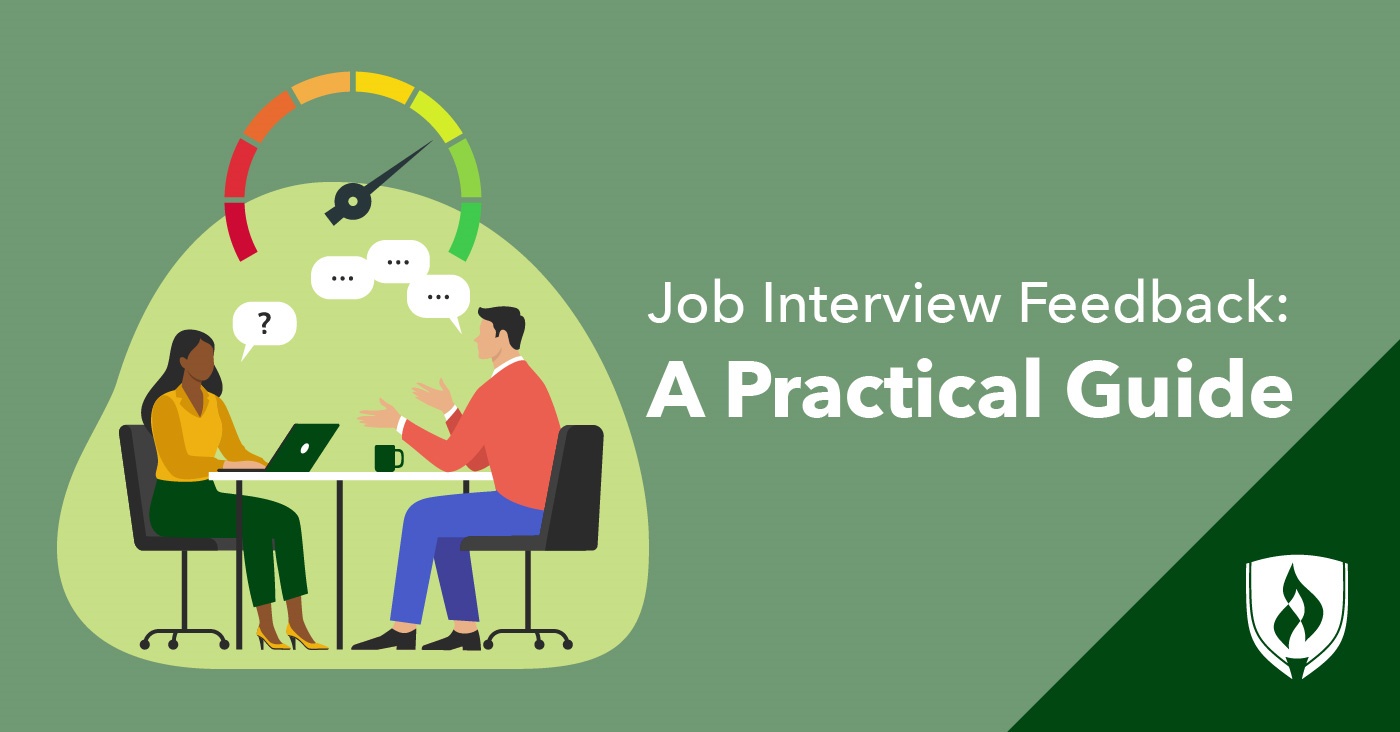
You’ve just finished the big job interview and nervously await a response call or email. As you replay what you said in your mind, you can’t help but wonder what the interviewer thought of you. Did you seem acceptably confident or way too cocky? Were you dressed appropriately? Did you seem engaged with what they were saying or come across as overeager?
It may be tempting to ask for job interview feedback but be careful! Gathering feedback the wrong way could hinder your chances of getting that dream position. So how do you know what to improve in your interviews? And when is it okay to ask for feedback?
To help with that, we’ve asked Elizabeth Lintelman, director of Career Services at Rasmussen University, to share some of the essential dos and don’ts for gathering job interview feedback.
When is it okay to ask for job interview feedback?
Generally, asking your interviewer for feedback is unprofessional. While you may want to improve future interviews or gauge how you did, requesting feedback at your interview can put the interviewer on the spot. For one, they may not have their opinion of you fully formed yet. And requesting feedback after the meeting can create unexpected extra work for human resources or your interviewer that doesn’t really benefit the organization.
“The purpose of an interview is to provide an opportunity for the employer to get to know the candidate and for the candidate to get to know the employer,” says Lintelman. “An interview is not the place to be asking how to improve your interview skills.”
At an interview, you should focus on answering the questions adequately and presenting yourself professionally. The conversation is a way for the employer to learn if you are a good fit for the position. You can learn more about the employer too by asking questions and being observant. Remember, it’s an interview, not a performance review.
That said, there is one way you can politely gather some feedback from the company.
Lintelman suggests waiting until the interviewer asks if you have any questions. She says, “The very last question could be ‘Is there anything I’ve said today that makes you think I’m not a good fit for this position?’”
Depending on their response, this can give you another chance to address any areas of concern. While not every reservation an employer may have about you is going to be fixable on the spot, you may have an opportunity to correct the record if there was a question where the interviewer didn’t understand your response or you forgot to mention something important.
How else can you get feedback?
There are plenty of other ways to polish up your interviewing skills aside from directly asking your interviewer. When preparing for that intimidating interview, you should consider getting another person’s perspective on your performance. Plus, practicing in front of a mirror gets tedious.
The first stop for Rasmussen University students should be Career Services.
“Most of our Career Services staff not only have advanced degrees but also have experience as recruiters and hiring managers and can provide feedback directly from the perspective of an employer,” Lintelman says. “Rasmussen University’s Career Services department also has exceptional resources to help job seekers navigate the interview process. From webinars to handouts and our Hiration system, job seekers have a robust network of tools to help them feel more confident for their next interview.”
Another option Lintelman suggests is to practice mock interviews. Ask a network connection, family member or friend for their help. She says that more practice means more confidence, which is key to landing that big job. If you prefer to mock interview with a career development specialist, the Rasmussen University Career Services team offers this opportunity to both alumni and current students.
Lintelman advises practicing job seekers to ask for constructive and honest responses—even if you might not like what you hear. From there, it’s on you to act on that feedback. If you seem nervous, consciously try to stop fidgeting. If you tend to say “um” or other filler words a lot, take a moment to consider and formulate an answer before responding.
You can also brainstorm strategies with your interview partner. Ask them about potential changes to your answers or presentation. Test out and adapt the strategy in real time before the real deal.
How to respond to feedback from an interview
You’ve made it to the end of the interview and asked about any worries the company had with your responses. The interviewer says you were professional, but they have a couple of concerns. Now what?
The most important thing to remember when receiving interview feedback is that your response shows your character. It may be tempting to get defensive, but this can harm your chances of getting the job. Even if you feel you did perfectly and are completely qualified, you still need to maintain your composure through any uncomfortable feedback.
Think about it from the interviewer’s perspective. Staying calm and collected shows you can work under pressure and handle criticism. It also shows that you genuinely care about clear communication and self-improvement. Even if you don’t get the position, the employer may consider you for future openings if you stay professional. Every interview is an opportunity to grow your network.
Lintelman says not to take any negative feedback personally or let it deter you. One way to reframe the situation is to consider that anybody who wants you to succeed will give you honest feedback, which will probably include some criticism.
Finally, you should thank the interviewer for any advice or clarifying questions they had. Be gracious whether or not they loved your interview. If nothing else, you can learn from the experience.
Get ready for your next interview
You’re one step closer to landing the perfect role now that you’re a pro at receiving job interview feedback. While the process of interviewing for jobs can sometimes be a rollercoaster of emotions, know that each interview you complete will help you improve as you absorb and act on constructive criticism.
The next step is to find other ways to perfect your interview presentation. But what about when something you haven’t rehearsed for happens? No matter how many practice interviews you do, there can always be that one question that comes out of left field, stumping even the most seasoned interviewer. Learn how to stay confident with the hardest questions by reading our article “7 Strategies for Handling Challenging Interview Questions.”




